To better understand effective communication, let's explore the concept of the Square of Communication. This model consists of an outer square, representing optimal conditions, and an inner square, focused on crafting the message.

In the outer square, four key elements shape the optimal conditions for communication: the right time, place, agenda, and way. It's crucial to choose the right timing that works for both parties, ensuring focus and engagement. Select a location that promotes comfort and convenience, creating a positive atmosphere free from distractions. Prepare a well-structured agenda that sets expectations and allows for logical and coherent delivery of the message. Mindfully consider the style and tone used to convey the message, adapting it to suit the needs of your colleague while demonstrating respect and courtesy.
Moving to the inner square, crafting the message involves four essential elements: the fact, self-revelation, relationship, and appeal. Communicate the data and information you wish to share—the fact. Reveal something about your motives, values, emotions, or personality to create authenticity and empathy—the self-revelation. Express how you perceive the relationship, establishing trust and understanding—the relationship. Formulate the request, desire, or instruction you seek from the receiver, fostering collaboration and shared accountability—the appeal.
Consider this example of a team member consistently missing project deadlines:
The fact: "The last deadline was missed by a significant margin, and it looks like this one is likely to be too."
The self-revelation: "I'm under significant pressure to bring this project in on time."
The relationship: "I want to help you so that we can all succeed together."
The appeal: "Please share with me the challenges you're facing in meeting the deadlines, so we can find a way forward together."
It's important to recognize that messages can be received and interpreted differently based on the emphasis and tone used. Misunderstandings and conflicts may arise when the the two parties prioritize different aspects of the message. To minimize these challenges, executives must be aware of their communication style and actively listen to others. By adopting a conscious approach, they can foster a culture of open dialogue, mutual respect, and effective problem-solving.
While planning and optimal conditions are ideal, there will be situations where impromptu communication is necessary. In those cases, focusing on essential communication skills becomes crucial. Executives should actively listen, pay attention to non-verbal cues, manage stress and emotions, and assert themselves appropriately.
Effective communication is vital for successful leadership in business. By understanding the key elements of effective communication and utilizing the Square of Communication model, executives can enhance their message delivery and foster collaboration. Mastering essential communication skills builds strong foundations for challenging conversations, promoting open dialogue, understanding, and collaboration in the workplace.